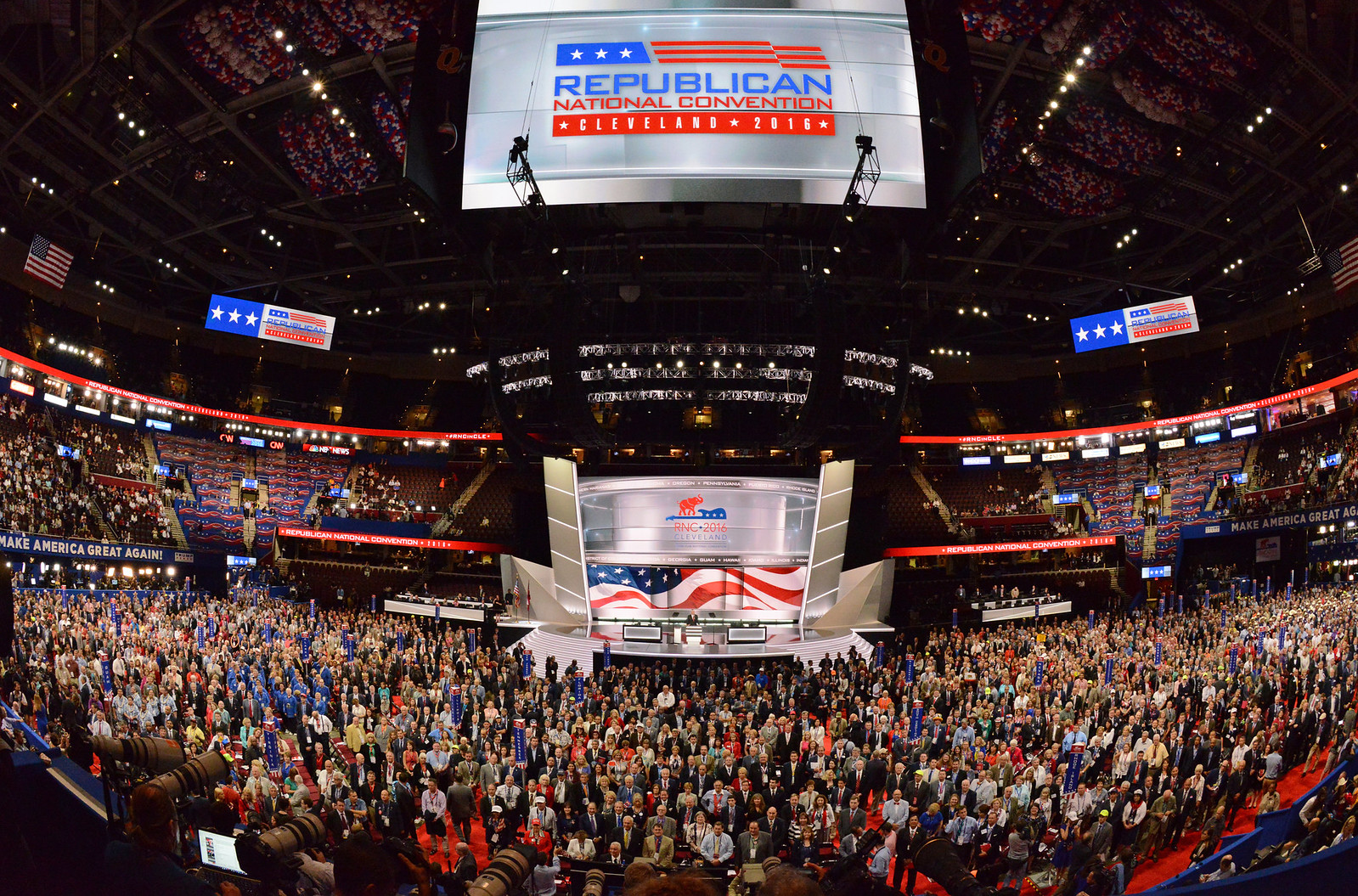Charlotte’s RNC Leader: ‘I’m Still In Shock’

Now the fallout begins.
After the Republican National Committee officially announced that almost all of Charlotte’s Republican National Convention is moving to Jacksonville, Florida, the local host committee is left with a mess to clean up.
Will it be able to pay off its debts?
Will the Republican National Committee demand that the money it raised be diverted to Florida?
John Lassiter is president of Charlotte’s host committee. His main job was to raise $70 million for the convention — and to secure things like the arena, the contractor to build the state, all the transportation, all the hotel reservations.
He has a long history in Charlotte politics, serving on the Board of Education and the City Council.
But he had been out of the political arena since 2009 when he lost the mayoral race to Democrat Anthony Foxx. That race came after Pat McCrory had been mayor for 14 years, and it was a big surprise when a Democrat won.

We spoke to Lassiter last week about how everything fell apart.
When did you realize things were breaking down and this wouldn’t be the convention you envisioned?
Well, about 9:15 (a.m.) on Memorial Day I saw a tweet from the (President of the) United States that the convention wouldn’t be in Charlotte – that was a good clue. And there were various actions in actions and inactions that occurred over the days to follow that became real clear before a formal announcement.
There were meetings between the city and host committee and the RNC. But at that point was it already done?
Once the leader of the Republican Party said what was going to happen, that pretty much closed the door. We had attempted to bring all the parties together. We had reached out to the RNC, to the governor’s office. We never heard back from the governor’s office. At that point, the RNC was frustrated to get any sort of compromise. And we started the process of unwinding.
So you say you never heard from the governor. Were you trying to get the governor to say, “OK, you can’t do a full arena, what can we do?” And you are saying you never got an answer?
Never got a response.
So you made calls and sent emails and it was just silent?
Well, the governor knew where we were and what we were doing. The negotiations between the governor’s office and the RNC had broken down so significantly at that point. There was a decision at the governor’s office that we wouldn’t provide anymore compromise. They were locked into a “no more than 10 people.” (The state’s limit on indoor gatherings.)
The thing that’s most disturbing for me is that impact on a lot of organizations is broader and more impactful long term. This affects all of our convention travel throughout the state. It affects all performing arts, it affects churches, entertainment venues like the Biltmore in Asheville. We had this “winners and losers” choice that I don’t think is how public policy should be exercised. And unfortunately, the people who are most affected are the working families who derive their livelihood through working in that industry. It’s sad we couldn’t find a way to revive that industry.
I know the arena was a big issue. But what about the 10-person limit in terms of hotels and hotel ballrooms. (The governor’s office) wasn’t budging on that?
No. That’s still not an option.
I thought that maybe everyone got past the arena, there might be talks about, well, we can do 50 in a hotel ballroom with social distancing?
We just made no progress. Those are the unintended damages. I’m president of the Rotary Club and we can’t hold our meetings in a hotel ballroom.
Given that, moving past the arena issue … given the 10-person limit, it seems like the RNC had no choice to go somewhere else, right?
There should have been some give-and-take.
And with the RNC bringing the 336 delegates for this “business convention” – do you feel like they are doing this to satisfy their contractual agreements?
Well, they aren’t going to satisfy contractual obligations because they have breached our agreements. If they want to hold additional meetings here, we will facilitate that. We know that is at least some amount of positive activity that will benefit our hospitality. How many rooms will they take, how many meetings will they have? We don’t know the answer to that. It won’t be our responsibility. Our obligations exist only for the purpose of the national convention, and that’s been moved to Jacksonville.
So you are saying with the group of 500 they are bringing – they are essentially on their own?
We had the reservations on all the hotel rooms – 15,000 to begin with. They have been slowly backing those contracts out. You won’t have the flow of other folks who come to the convention. You won’t have the 2,500 delegates, the 15,000 media, the Secret Service, the police from around the country. If it’s a sliver of what it was going to be and it will help some folks (economically) then we need to allow that to occur.
The host committee was tasked with raising $70 million, and you have commitments for $50 million at this point. And you have said none of that money is going to Jacksonville, is that right?
That’s correct. None of the money that we have raised, none of the money that has been committed to us, none of the services and products will be sent to Jacksonville.
Are they in agreement with that? Or do you anticipate there being a fight over this and possibly lawsuits over the money?
No, they would like to have some of that to carry out their obligations down there. So we have to work through these differences. Those are some of the issues we have to wrestle with.
When did you decide that (no money will go to Florida)? Will they have a feeling that they are entitled to that? Your position is that you were raising money for a convention in Charlotte?
Actually, we were raising money for economic development in Charlotte. The nature of our 501(c)(3) is an economic development organization. And its full focus is to bring that excitement and spend what was promised by the Republican National Committee. I never believed anything could go anywhere. I’m still in shock that there was a decision to move it away considering all the constraints in our contract. It wasn’t just an immediate revelation, but the contracts are pretty clear.
There can be litigation from them to you to access that money. But do you anticipate there being litigation from the host committee to the RNC seeking damages for not bringing the convention here?
Right now I think we’re trying to amicably work through your differences. We still have to go through a wind-down process. We have to terminate our vendor agreements, and venue reservations and a significant number of obligations that go into the tens of millions of dollars. You don’t start that process thinking litigation.
You started this interview mentioning the president’s tweet on Memorial Day. The president has a long history of breaking contracts when he feels it’s necessary. No one could have envisioned the pandemic, but knowing his history and his behavior, does it surprise you he behaved this way?
It’s not for me to judge the actions of the president. We’re not a political organization. We’re an economic development organization. We are barred from political activity. We have to carry out our obligations as best we can.
I assume a lot of your money are pledges. Are companies released from their obligations?
Well no, if someone still wants to pay their pledge and it’s no different than if they pledge to a church building campaign or the United Way. People often pay over time. We would expect to pay their pledges … and if they do, that can be used to offset our losses in Charlotte. I don’t know if we start a big collection activity at this point.
You had to run a payroll for several months?
Several years.
In terms of losses … I assume a lot of money would be pouring in late this summer. Where are you in terms of getting in the black?
We have some significant obligations that haven’t been released yet. We owe money to the Hornets for the Spectrum Center. We owe money to contractors who were supposed to build that out. We owe money to people who were supposed to build transportation systems. We owe money to folks who were renting parking lots and venues. There are a lot of obligations and they go into the tens of millions that are currently pending.
Click here to subscribe to the Inside Politics podcast (and to give the podcast a rating/review in your favorite podcast app).
Want more? You can sign up here for our weekly Inside Politics newsletter, written by Steve Harrison.
Have a question about the 2020 RNC in Charlotte? Ask us below.